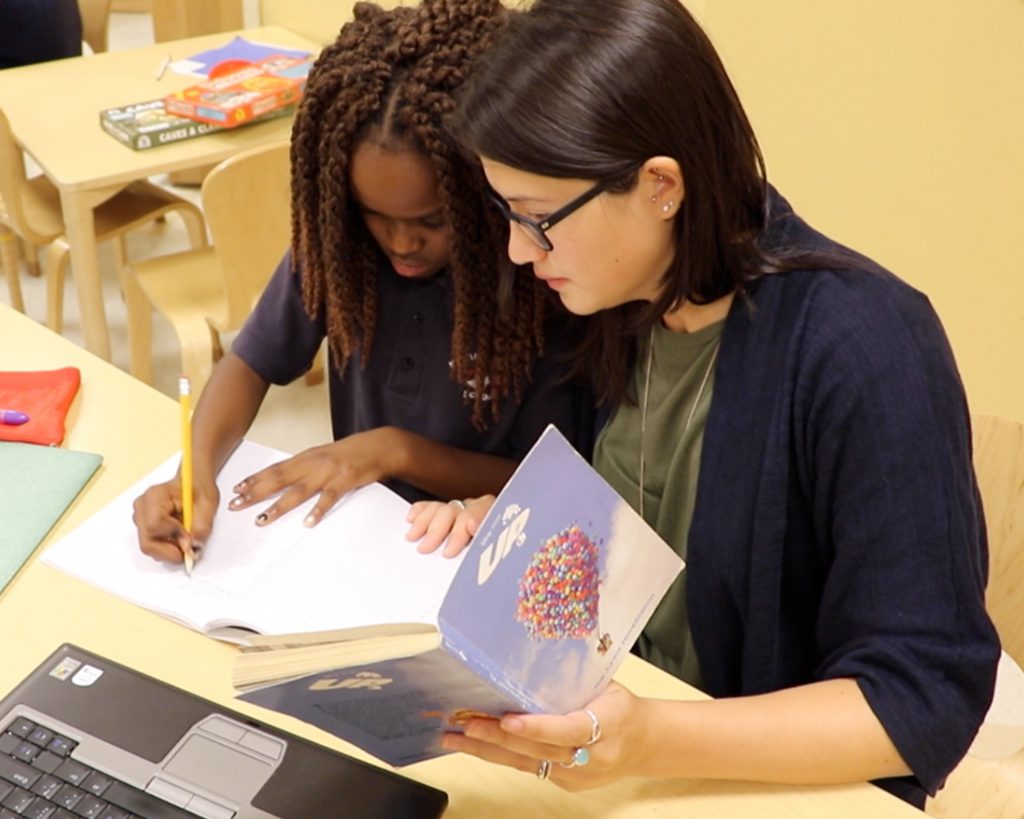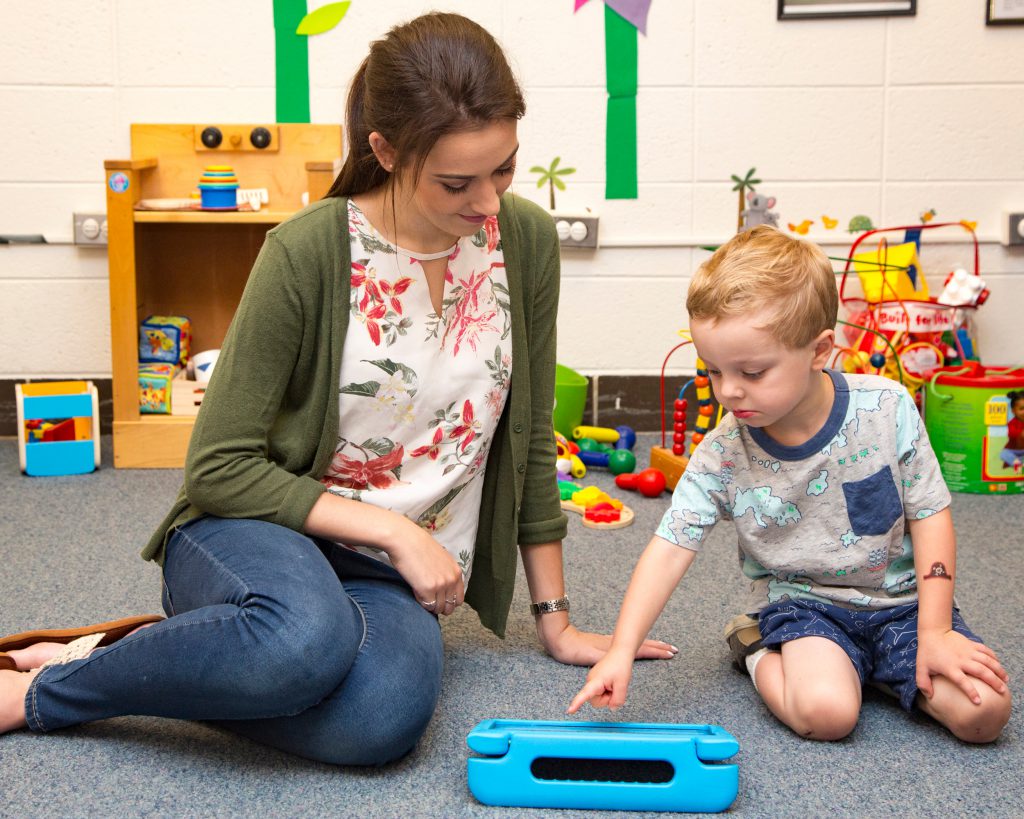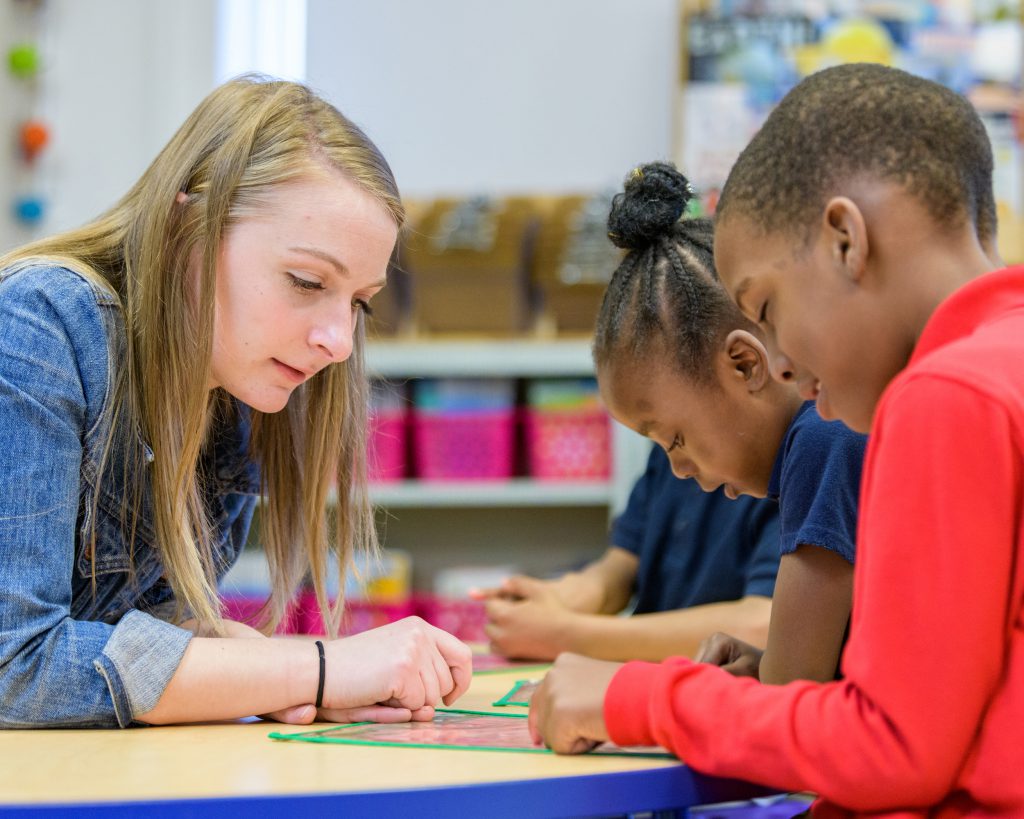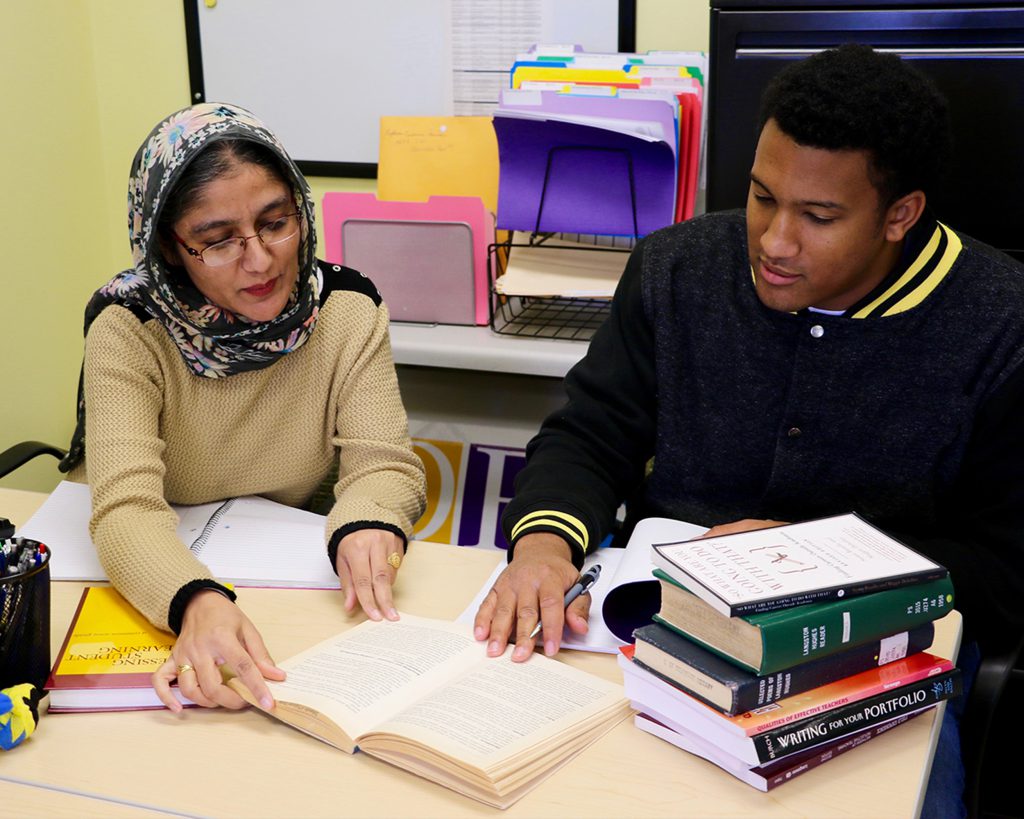Research
Literacy & Language
In today’s twenty-first century landscape, strong verbal, reading, and writing skills remain foundational to a person’s personal and professional success. Yet, much of America’s population struggles with the development of these critical skills, especially within classrooms with approaches that don’t consider the needs of its increasingly diverse students.
Our Literacy faculty engage in innovative research designed to help children, families, teachers, and their communities address challenges in language development, reading, and writing. Supported by grants and collaborative educational partnerships, our faculty study the neurocognitive basis of language development, leverage technology to provide high-quality instruction, and develop evidence-based interventions for early childhood through college students, including English Language Learners, historically disadvantaged students, and those with learning difficulties.
Through research informed by the learning sciences, our faculty have crucially demonstrated that how educators teach reading and writing matters. Our teacher preparation programs prepare our graduates to use these evidence-based instructional approaches in their future classrooms.
Researchers by Topic
How can we help English language learners in kindergarten and first grade strengthen their reading skills? And, how does a child’s ability to read in his or her native language affect the child’s ability to read in English? With the support of an Institute of Education Sciences grant, Steve Amendum studies how we can help improve early reading outcomes for students whose first language is not English. In a recent study, Amendum found that children who had stronger Spanish reading skills upon entering kindergarten experienced greater success over time when compared to their Spanish-speaking peers, who were more fluent in speaking English but less proficient in reading Spanish.
Christina Budde’s research focuses on the language and literacy development and instruction of early childhood and elementary age children from diverse backgrounds Her work explores meaningful literacy-learning opportunities for bilingual learners in areas such as peer learning, text-based small reading groups, and promoting second language development through guided play at regional and international conferences. Additionally, she provides professional development to educators who teach linguistically diverse learners by elucidating the planned and spontaneous micro-practices nestled within larger teaching practices that support language and literacy instruction.
Benjamin James specializes in language and literacy education and teacher preparation for working with multilingual learners in K-12 schools. His research focuses on preparing teachers to work with linguistically-marginalized students, including English learners and multilingual learners more broadly. He also explores video-embedded teacher learning to support novice teachers in incorporating more collaborative, action-based orientations to language and literacy instruction for multilingual learners across the curriculum.
Do specific reading skills, such as orthographic processing and word reading, transfer across languages? If so, how can we use this knowledge to improve reading instruction for English Language Learners? Adrian Pasquarella studies the transfer of skills in Spanish-English, Chinese-English, and French-English bilingual students in order to develop and test practices that support these students. In a study with Spanish-English and Chinese-English bilingual students, for example, Pasquarella found that word reading fluency—a complex blend of accuracy, speed, and expression, which supports reading comprehension—transferred between languages in both groups.
Christina Budde’s research focuses on the language and literacy development and instruction of early childhood and elementary age children from diverse backgrounds Her work explores meaningful literacy-learning opportunities for bilingual learners in areas such as peer learning, text-based small reading groups, and promoting second language development through guided play at regional and international conferences. Additionally, she provides professional development to educators who teach linguistically diverse learners by elucidating the planned and spontaneous micro-practices nestled within larger teaching practices that support language and literacy instruction.
How can teacher and child care provider preparation lead to improved language and literacy development in early childhood? Martha Buell’s research focuses on the professional development of early childhood teachers and child care providers and how it can improve the quality of early language and literacy experiences. Buell is also at the forefront of child care and early education program development and evaluation. With funding from the Administration for Children and Families, Buell studied family child care programs enrolled in statewide voluntary Quality Rating and Improvement Systems (QRIS) and how the relationship between global and literacy specific measures of quality correspond to QRIS ratings.
How do neurocognitive differences in a student’s brain affect language and literacy development, especially in students with disabilities? Stephanie Del Tufo explores language and literacy across the lifespan, studying the developing brain in children, the mature adult brain, and the aging brain. Through a new study in the Journal of Learning Disabilities, Del Tufo provided neurocognitive evidence that learning words in isolation is more beneficial for children with decoding difficulties in lessons related to oral reading. By contrast, learning words in contexts is more beneficial for all readers in lessons related to semantic information. This work can help inform what works, for whom, and when in the design of literacy curricula.
How do babies learn to talk? Why is play so important in early childhood? How can we help parents engage their children in activities that inspire curiosity and active learning? Can young children profit from electronic media? These questions are central to Roberta Michnick Golinkoff’s research program, which focuses on language development, the effects of media on young children, the benefits of play, and preschoolers’ early spatial knowledge. Her most recent book, Becoming Brilliant: What Science Tells Us About Raising Successful Children, argues that the development of six skills allows children to thrive in a global workplace, experience personal fulfillment, and become concerned citizens. With scientific evidence and examples from school practices, Golinkoff and coauthor Kathy Hirsh-Pasek show how parents and educators can nurture collaboration, communication, critical thinking, innovation and confidence in children.
How can early interventions for at risk children support early language and literacy development and parent-child interactions? Can play help children learn to read? Myae Han’s work is focused on answering these and other questions through a variety of research approaches including applied and translational research. She seeks to better understand the relationship between play and early language and literacy development. Han, with funding from Early Reading First, has developed an intervention model using play as a way to support language and literacy for at-risk preschoolers.
How can we help English language learners in kindergarten and first grade strengthen their reading skills? And, how does a child’s ability to read in his or her native language affect the child’s ability to read in English? With the support of an Institute of Education Sciences research grant, Steve Amendum studies how we can help improve early reading outcomes for students whose first language is not English. In a recent study, Amendum found that young children who had stronger Spanish reading skills upon entering kindergarten experienced greater success over time when compared to their Spanish-speaking peers, who were more fluent in speaking English but less proficient in reading Spanish.
How do neurocognitive differences in a student’s brain affect language and literacy development, especially in students with disabilities? Stephanie Del Tufo explores language and literacy across the lifespan, studying the developing brain in children, the mature adult brain, and the aging brain. Through a new study in the Journal of Learning Disabilities, Del Tufo provided neurocognitive evidence that learning words in isolation is more beneficial for children with decoding difficulties in lessons related to oral reading. By contrast, learning words in contexts is more beneficial for all readers in lessons related to semantic information. This work can help inform what works, for whom, and when in the design of literacy curricula.
How can teachers optimize technology to support students’ literacy development, especially in the online classroom? Rachel Karchmer-Klein investigates the relationships among literacy skills, digital tools, and teacher preparation with particular emphasis on technology-rich instructional design and online learning. In Improving Online Teacher Education, published by Teachers College Press, Karchmer-Klein shares methods for integrating evidence-based practices into online teaching environments, including think alouds, case-based instruction, peer feedback, and field experience.=
How can classroom teachers support content learning and literacy development across disciplines? Lewis’s research centers on how middle and high school teachers can support these goals through strategic instruction before, during, and after reading. His recent publications, for example, focus on how teachers in all content areas can design their own text sets to build students’ background and content knowledge.
How do we evaluate the impact of new educational programs, policies, and inventions? How do we conduct field experiments to produce unbiased estimates of these impacts? How can educators engage with research to inform their decisions about policy and practice? Henry May, a quantitative methodologist who works across content areas, designs and conducts rigorous studies to evaluate educational initiatives. He serves as the PI or co-PI on grant-funded projects evaluating the impacts of interventions such as a writing curriculum for community college students, a web-based early reading intervention, a fraction sense intervention for middle school students, and programs related to college readiness in Delaware. He also serves as co-PI of a grant-funded study of how educators engage with researchers and research evidence. May is also Director of the Center for Research in Education and Social Policy (CRESP), which houses the Center for Research Use in Education (CRUE).
What can elementary teachers do to identify and support students in their classroom who may have reading disabilities? What kind of instructions best supports these learners so that they continue to progress with their reading development? Kristen Ritchey’s research centers on identification and intervention for elementary students. Recently, Ritchey evaluated a short-term reading intervention for fifth-grade students using an informational science text, which improved reading comprehension.
What role do families play in children’s literacy and learning? How can families and teachers in different educational environments support oral language comprehension, early reading, and early writing? Carol Vukelich studies children’s early literacy development and teachers’ professional development, specifically coaching and reflection strategies. Her recently updated book, Helping Young Children Learn Language and Literacy: Birth through Kindergarten (5th edition), focuses on four central themes: family involvement in literacy learning, teaching and learning that blends constructivism and science-based instruction, respect for diversity, and instruction-based assessment.
How can educators better prepare students to be proficient readers? The design and implementation of tiered reading instruction is a focal point of Sharon Walpole’s work. Walpole also studies the design and effects of schoolwide reforms, particularly those involving literacy coaches. Currently, she is supporting state- and district-level Response to Intervention (RTI) initiatives and PK-12 State Literacy Plans. Dr. Walpole is the author of the free Open Educational Resource Bookworms. This evidence-based curriculum has generated impressive results for improving student achievement.
How do we identify a student at risk for writing difficulties? Do all students who struggle with writing share the same characteristics? David Coker contributes research on writing assessment, writing development, and improving writing instruction, especially within schools that serve low-income and historically disadvantaged students. In a recent publication with SOE colleagues, Coker found that there are distinct differences among students that struggle with writing, as early as the first grade. This work underscores the need for increased focus on writing development and differentiated instruction (including intensive intervention) in the early elementary grades.
Could collaborative conversations about controversial topics help strengthen students’ argumentative writing skills? If so, how can teachers support the transition from conversation to writing? Ralph Ferretti studies writing instruction and interventions that promote students’ self-regulatory skills, especially in argumentative writing. His current project, supported by the Institute of Education Sciences, explores whether middle schoolers’ critical writing skills improve when they have conversations with their peers about controversial issues.
In what ways can teachers use supplemental readings to help their students develop their argumentative writing skills? What role can CliffNotes play in classroom instruction? William Lewis’s research, designed for practitioners in the classroom, centers on secondary content area reading and writing, especially persuasive writing and argumentation. His recent publications discuss using thematic texts to build background knowledge for writing assignments and detail how teachers can leverage CliffNotes, for example, to enhance student comprehension of literary texts.
Many community college students must take developmental writing courses to improve their skills before progressing to other courses. How can we encourage these students to take ownership of their learning and develop transferrable writing skills? Charles A. MacArthur contributes research on writing development and instruction for struggling writers, the development of self-regulated strategies, adult literacy, and applications of technology to support reading and writing. Funded by Institute of Education Sciences, his Supporting Strategic Writers project develops and evaluates a writing curriculum for college basic writing classes. Through this curriculum, students learn how to plan, draft, and revise compositions, enact self-regulation strategies, and implement common organizational structures, among other skills.
How do we evaluate the impact of new educational programs, policies, and inventions? How do we conduct field experiments to produce unbiased estimates of these impacts? How can educators engage with research to inform their decisions about policy and practice? Henry May, a quantitative methodologist who works across content areas, designs and conducts rigorous studies to evaluate educational initiatives. He serves as the PI or co-PI on grant-funded projects evaluating the impacts of interventions such as a writing curriculum for community college students, a web-based early reading intervention, a fraction sense intervention for middle school students, and programs related to college readiness in Delaware. He also serves as co-PI of a grant-funded study of how educators engage with researchers and research evidence. May is also Director of the Center for Research in Education and Social Policy (CRESP), which houses the Center for Research Use in Education (CRUE).
What can elementary school teachers do to identify and support students who may have writing difficulties? In addition to identifying and supporting students with reading disabilities, Kristen Ritchey also contributes research on supporting children with difficulty in writing. With SOE colleague David Coker, Ritchey has published on identifying students with writing difficulties in the first grade and explored how a teacher’s instructional practice and theoretical orientations in the classroom can affect a student’s writing development.
How can educators leverage technology to improve the quality of students’ writing? Can automated writing evaluation help identify students who may have learning disabilities? Joshua Wilson’s research centers around the use of automated writing evaluation (AWE) as a tool for educators in preparing students to be proficient writers. In a recent study published in the Journal of Educational Computing Research, Wilson found that automated writing evaluation is effective at supporting positive writing outcomes and can lead to improved performance on state English language arts tests.
Funded Research & Engagement
Early Academic Achievement and Intervention Response: Role of Executive Function
Co-PIs: Stephanie Del Tufo, L. Cutting
National Institutes of Health
Doctoral Students

Andrew works as a research assistant on Skip MacArthur’s Supporting Strategic Writers grant, a project to develop and evaluate writing curriculum in college basic education courses.

Ye has worked as a Chinese immersion teacher in Delaware, and her research interests include cross-language transfer of metalinguistic awareness between languages among bilingual children.
In the News
During the holiday season, parents and caregivers are bombarded with flashy advertisements for the “best” or most “educational” toys for …
In celebration of National Children’s Book Week from November 3 to 10, University of Delaware’s College of Education and Human …
This article by Stephanie N. Del Tufo, assistant professor of education and human development at the University of Delaware, has …
As summer comes to an end, some parents and caregivers may notice that their children’s summer reading books still remain …
Research Centers & Labs
CRESP conducts rigorous research, program evaluation, and policy analysis to help practitioners, policymakers, and the researchers better understand critical issues in education, community health, and human services.
Since 1974, the Child’s Play, Learning and Development Lab has been exploring how children learn and grow, from how children develop language and spatial skills to how play can help scaffold learning.
Adapting Curriculum and Classroom Environments for Student Success (ACCESS) is a collaborative project that provides educators and families with the tools to improve educational outcomes for students with disabilities.
DIEEC works to improve the quality of early care and education experiences for young children and their families, with an emphasis on high-risk children. through the design, development, and testing of model programs.
The DANE Lab’s mission is to inspire learning, alleviate health disparities, and strengthen communities through literacy by studying how brain development during childhood and throughout adulthood impacts the mind.
The mission of the Early Learning Center is to provide a model of quality early care and education services for children and their families which supports the academic and research programs of the University of Delaware.
The University of Delaware Lab School engages in curriculum development, exploratory studies and serves as research site for university faculty and students. The school provides a model of exemplary practice and research-based professional development for practitioners serving children and their families.
The SSC brings together UD’s renowned Professional Development Center for Educators and Delaware Academy for School Leadership. With a systemic approach to improving student and school outcomes, the SSC is composed of experts in educator and school leader professional development who partner with teachers and administrators in public, charter and independent schools throughout Delaware and across the nation.



























